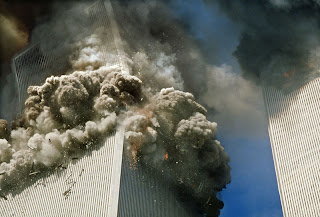What made it such a compelling read? Partially, of course, Capote's writing keeps the reader involved but I think the main driving force behind this book is the fact that it is real. This happened - the facts are all real (although there is some controversy about the accuracy of Capote's reporting on some details). Capote read about these killings in the paper and immediately packed up his suitcase and went out to Holcomb, West Kansas to cover this story. This Guardian Books article looks at this case which happened fifty years ago this month - it's a cracking read, so I recommend you check it out.
Truman Capote
Image credit: Here
This and the ethically thorny issue of profiting from re-telling someone else's misery are commonly raised when literature deals with tragedy and disaster. Even though I haven't even started writing it yet, I have come across this in my thesis about post 9/11 literature. Some people have reacted angrily to those who wish to portray the events of that day through any media - be it literature, in films, through photography... And this is understandable. For those suffering the loss of someone, their grief is a very personal experience and any intrusion into the sacred space of the memory of their loved one be it direct or indirect is intolerable. However, for events such as 9/11, there is another grief at work: public grief. This grief is predicated on not personal loss but societal loss, the collective trauma of seeing, time and time again, from various angles the planes flying into the towers and their subsequent collapse, knowing we were watching people lose their lives. There's also the grief for the loss of a sense of security and loss of stability.
Image credit: photographer unknown
I have to wonder about In Cold Blood, though. Was it necessary to have this gruesome murder written so definitively into America's history?
What are your thoughts on this? What do you think of representations of human tragedy and disaster? Historically and socially necessary or ethically and morally questionable?



Great post - I also read In Cold Blood this year, and like you, I wouldn't say I enjoyed as much as I was fascinated with it.
ReplyDeleteThe parallel between how that story is told and post-9/11 coverage is interesting. I think that the vast majority of journalism about 9/11 was historically and socially necessary. However, there were and are always the sensationalists who are writing ONLY to create shock and awe, and not to report. Those journalists/writers ruin it for the rest of us!
Capote's book was a totally new thing - he practically invented the true crime drama. I'm not sure I subscribe to the theory that he was profiteering from the town and that story (he never wrote another book after In Cold Blood 'cause the story so scarred him). It just seemed like the story was so unusual and he was so curious about it, and if you believe the movie Capote, the killer, too, that he felt as though it was a story that MUST be told.
By the way, there are a few pages in Irving's Last Night in Twisted River devoted to 9/11, as if you need more to look into for your thesis, right? ;)
Hi Greg :) Thanks for the comment. I wasn't trying to draw a parallel so much as this idea that some of the townspeople not liking In Cold Blood reminded me about the ethically challenging issues facing literature to do with tragedy and disaster such as 9/11 - sorry if it wasn't totally clear (it all made sense in my head haha).
ReplyDeleteYou're right, Capote did do something completely different and he didn't do it with the intention to get profit, that's for sure. The idea is though that he DID profit from it - big time - and the question is: is that right? Also, he thought it was a story that had to be told, but whose story was it to tell?
I'm not coming down on either side of the fence for that debate - it's just interesting to think about. :)
Well, if Twisted RIver has stuff in it about 9/11, I could justify another book purchase :D I may as well start there on my Irving discovery tour :)
I think "In Cold Blood" was so huge because it really blew the roof off the idea that there is a safe place to live. Small town? Midwest? That time period? People really didn't believe something like this could happen in someplace like that. That wasn't true, of course. But Capote was the first person to make people really believe it.
ReplyDelete